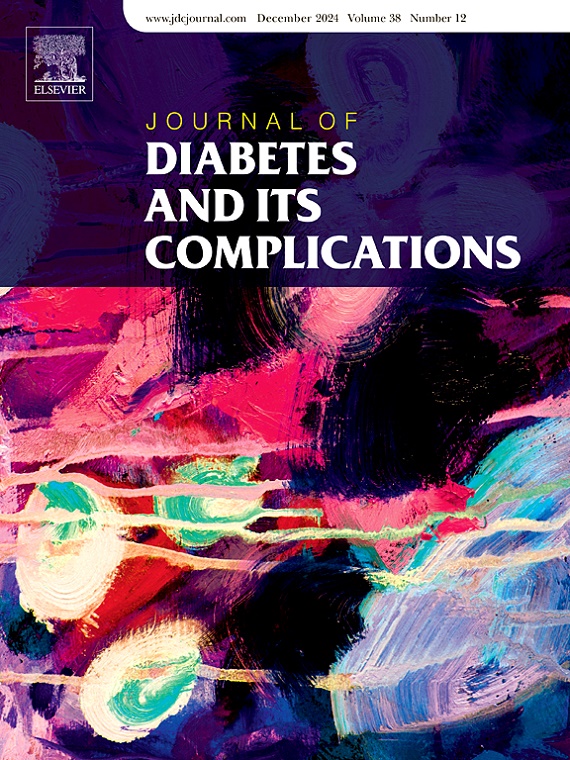Degludec胰岛素与efsitora胰岛素在糖尿病治疗中的对比:一项系统综述和荟萃分析
IF 3.1
3区 医学
Q3 ENDOCRINOLOGY & METABOLISM
引用次数: 0
摘要
目的比较新一代基础胰岛素与降糖精胰岛素治疗1型和2型糖尿病的疗效和安全性。方法系统检索PubMed、Embase和CENTRAL数据库至2024年10月。本研究遵循PRISMA指南。采用R 4.4.1版本进行统计分析。使用RoB2工具评估偏倚风险,使用GRADE方法评估证据质量。本研究在PROSPERO注册,注册协议为CRD42024597806。结果纳入6项随机对照试验,共2590例患者。其中,1376例(53.13%)接受胰岛素注射。efsitora和degludec在降糖疗效结局方面无显著差异,包括HbA1c降低、空腹血糖、体重变化和达到HbA1c的患者比例7%。关于安全性结局,大多数终点,如不良事件、注射部位反应、过敏、严重低血糖和死亡率,组间具有可比性,没有显著的亚组效应。然而,亚组分析显示,2型糖尿病患者夜间低血糖伴efsitora发生率较低,1型糖尿病患者严重不良事件发生率较高,提示安全性存在潜在的人群特异性差异。结论依西妥拉与降糖糖胰岛素治疗糖尿病的总体疗效和安全性相似。然而,亚组分析表明,患者的特定因素,如糖尿病类型,可能会影响某些不良事件的风险。这些发现支持了根据患者特征和风险概况进行个体化胰岛素选择的重要性。本文章由计算机程序翻译,如有差异,请以英文原文为准。
Degludec insulin versus efsitora insulin in diabetes mellitus management: A systematic review and meta-analysis
Purpose
To compare the efficacy and safety of next-generation basal insulin efsitora versus insulin degludec in managing type 1 and type 2 diabetes.
Methods
We systematically searched PubMed, Embase, and CENTRAL databases until October 2024. This study followed PRISMA guidelines. Statistical analyses were performed using R version 4.4.1. The risk of bias was assessed using the RoB2 tool, and the quality of evidence was evaluated using the GRADE approach. This study was registered in PROSPERO under protocol CRD42024597806.
Results
Six randomized controlled trials involving 2590 patients were included in the analysis. Of these, 1376 (53.13 %) received efsitora insulin. No significant differences were observed between efsitora and degludec in glycemic efficacy outcomes, including HbA1c reduction, fasting blood glucose, weight change, and proportion of patients achieving HbA1c <7 %. Regarding safety outcomes, most endpoints, such as adverse events, injection site reactions, hypersensitivity, severe hypoglycemia, and mortality, were comparable between groups, with no significant subgroup effects. However, subgroup analysis revealed a lower incidence of nocturnal hypoglycemia with efsitora in patients with type 2 diabetes, and a higher rate of serious adverse events in patients with type 1 diabetes, suggesting potential population-specific differences in safety profiles.
Conclusion
Efsitora and degludec insulins show similar overall efficacy and safety in the management of diabetes. However, subgroup analyses indicate that patient-specific factors, such as diabetes type, may influence the risk of certain adverse events. These findings support the importance of individualized insulin selection based on patient characteristics and risk profiles.
求助全文
通过发布文献求助,成功后即可免费获取论文全文。
去求助
来源期刊

Journal of diabetes and its complications
医学-内分泌学与代谢
CiteScore
5.90
自引率
3.30%
发文量
153
审稿时长
16 days
期刊介绍:
Journal of Diabetes and Its Complications (JDC) is a journal for health care practitioners and researchers, that publishes original research about the pathogenesis, diagnosis and management of diabetes mellitus and its complications. JDC also publishes articles on physiological and molecular aspects of glucose homeostasis.
The primary purpose of JDC is to act as a source of information usable by diabetes practitioners and researchers to increase their knowledge about mechanisms of diabetes and complications development, and promote better management of people with diabetes who are at risk for those complications.
Manuscripts submitted to JDC can report any aspect of basic, translational or clinical research as well as epidemiology. Topics can range broadly from early prediabetes to late-stage complicated diabetes. Topics relevant to basic/translational reports include pancreatic islet dysfunction and insulin resistance, altered adipose tissue function in diabetes, altered neuronal control of glucose homeostasis and mechanisms of drug action. Topics relevant to diabetic complications include diabetic retinopathy, neuropathy and nephropathy; peripheral vascular disease and coronary heart disease; gastrointestinal disorders, renal failure and impotence; and hypertension and hyperlipidemia.
 求助内容:
求助内容: 应助结果提醒方式:
应助结果提醒方式:


